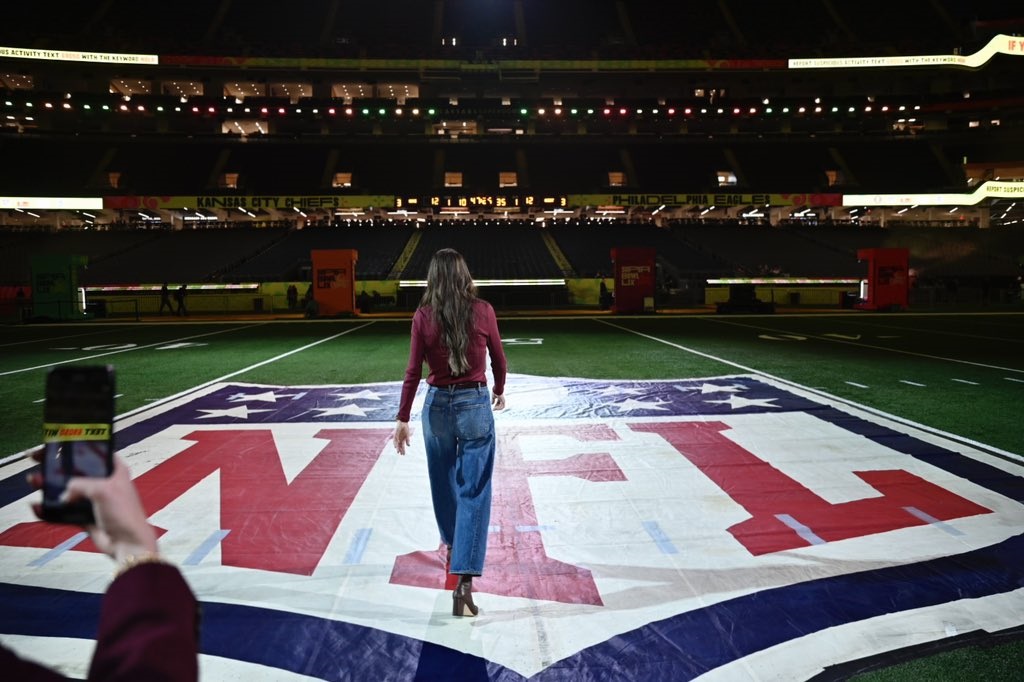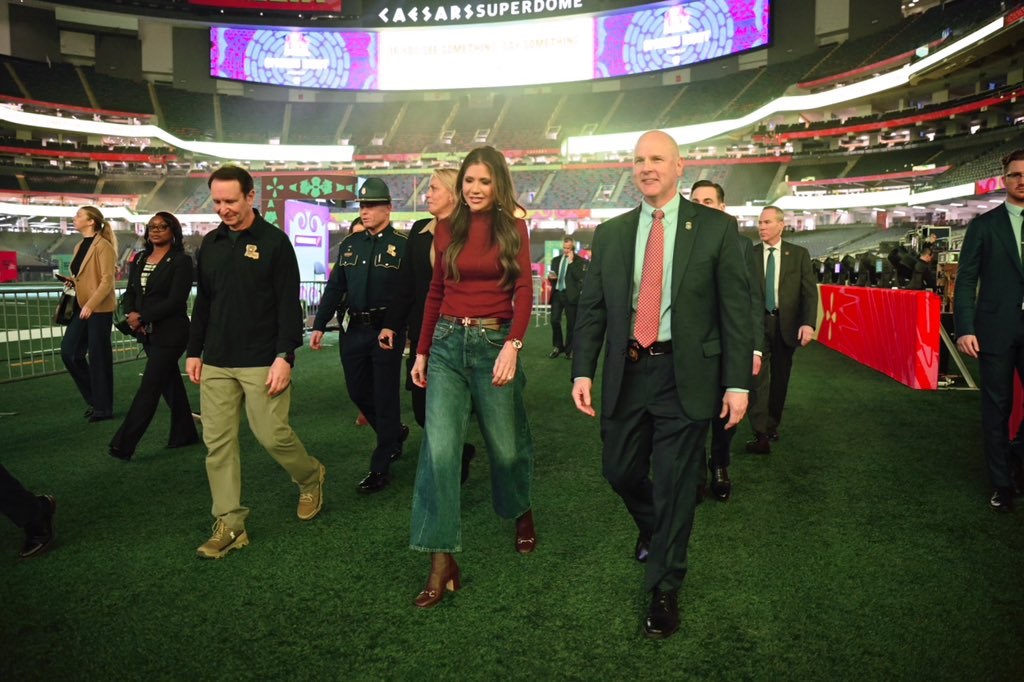How Feds Are Tackling Security for Super Bowl LIX
Before Super Bowl LIX kicks off on Sunday, Feb. 9, a massive coalition of federal, state, and local officials is hard at work to ensure the safety and security of employees, players, and fans during the big game at Caesars Superdome in New Orleans.

The Trump administration’s newly appointed U.S. Department of Homeland Security (DHS) secretary, Kristi Noem, traveled to New Orleans this week to observe DHS security operations for Super Bowl LIX. About 700 employees representing 12 DHS agencies are in the city as part of a 20-year partnership with the National Football League (NFL) and state and local law enforcement.
“Around 100,000 people will be celebrating the Super Bowl in and around the Superdome in New Orleans this weekend,” said Noem. “We will give law enforcement every resource they need to ensure a safe event. Thank you to our partners, Governor Landry, Mayor Cantrell, and the New Orleans Police Department. If you see something, say something!”
DHS has assessed this year’s Super Bowl as a Special Event Assessment Rating (SEAR) Level 1 event. Although DHS said that no specific, credible threats related to this year’s game have been identified, the U.S. remains in a heightened threat environment, as evidenced by the recent terror attack in New Orleans on New Year’s Day.
“Since day one, we have stood steadfast in our mission: to protect what matters most,” said Eric DeLaune, Homeland Security Investigations (HSI) New Orleans Special Agent in Charge and lead federal coordinator for Super Bowl LIX. “From securing critical infrastructure to providing real-time threat analysis, we are committed to safeguarding our communities. With over 690 DHS personnel deployed, we bring cutting-edge security resources and technologies to ensure every aspect of this event is protected.”
DHS security efforts for Super Bowl LIX include the following:
- U.S. Customs and Border Protection (CBP): Air and Marine Operations (AMO) will enforce temporary flight restrictions around Caesars Superdome, providing “eye in the sky” intelligence, surveillance, and reconnaissance flight operations in and around key venues, including the Superdome, airport, Bourbon Street, and the Ernest N. Morial Convention Center. Additionally, CBP will provide video surveillance capabilities and non-intrusive inspections by scanning the cargo entering the stadium for contraband such as narcotics, weapons, and explosives. CBP will also work to intercept counterfeit NFL merchandise such as NFL jerseys, championship rings, T-shirts, caps, and all sorts of souvenirs and memorabilia, which are often used to fund criminal organizations.
- Homeland Security Investigations: An HSI Special Response Team is standing by to provide interior stadium tactical support, and HSI’s special agents will also support CBP, local law enforcement agencies, and other private partners in identifying and investigating any flea markets, retail outlets, street vendors, and online marketplaces selling counterfeit goods during the week leading up to the Super Bowl to protect consumers, who are expected to spend over $16.5 billion nationwide. HSI will also oversee the coordination of DHS assets with local, state, and federal law enforcement agencies to ensure essential public safety measures and resources are in the right place, at the right time.
- Cybersecurity and Infrastructure Security Agency (CISA): On Super Bowl Sunday, CISA will also deploy advisors and emergency communications coordinators to support local law enforcement, emergency responders, and private partners in New Orleans. Ahead of the event, the agency conducted physical and cybersecurity vulnerability assessments, planning exercises, and bomb safety workshops with state and local partners.
- Office of Intelligence & Analysis (I&A): I&A worked with the Federal Bureau of Investigation (FBI) to assess the threat landscape leading up to the Super Bowl, including sharing timely and actionable information and intelligence with their state and local partners.

- Countering Weapons of Mass Destruction Office (CWMD): CWMD provided surge support from its Mobile Detection Deployment Program and its BioWatch program in coordination with the City of New Orleans.
- U.S. Coast Guard (USCG): USCG Pacific Strike Team is supporting the Mobile Detection Deployment Program to bolster DHS’s ability to detect and interdict chemical, biological, radiological, and nuclear threats, and Canine Explosive Detection teams will support the safety and security of the event.
- Transportation Security Administration (TSA): A TSA Supervisory Federal Air Marshal will staff the Fusion Watch Center during the event, and will use its National Deployment Force to increase the number of transportation security officers working at Louis Armstrong New Orleans International Airport to screen the increased number of departing passengers after the Super Bowl. In preparation, TSA also installed new security equipment at the airport. Furthermore, TSA’s explosive detection canines and Visible Intermodal Prevention and Response (VIPR) teams will work during Super Bowl week events at key venues.
- Science & Technology Directorate (S&T): S&T will deploy easy-to-assemble, expandable security barriers that can be installed quickly to provide critical asset protection and intrusion prevention.
- Federal Emergency Management Agency (FEMA): FEMA will help keep fans safe by providing communication tools for state and local responders.
- DHS Blue Campaign: This public awareness campaign is disseminating digital and out-of-home advertising in the New Orleans area to raise human trafficking awareness among visitors, local residents, and those working in industries, such as hotels, hospitality, and transportation, where frontline employees are more likely to be in a position to identify and report human trafficking. The campaign’s Blue Lightning Initiative is also partnering with Louis Armstrong New Orleans International Airport to raise awareness and train staff to recognize and report human trafficking.
Notably, other federal agencies are doing their part to secure the Super Bowl. For example, the U.S. Department of Energy’s National Nuclear Security Administration is conducting low-altitude helicopter flights to measure radiation levels over New Orleans and its surrounding areas, and the Federal Aviation Administration has established regional flight restrictions and designated Caesars Superdome a “no drone zone.”
ALSO READ: Super Bowl LIX: 10 Facility Facts About the Caesars Superdome
The post How Feds Are Tackling Security for Super Bowl LIX appeared first on Facilities Management Advisor.

